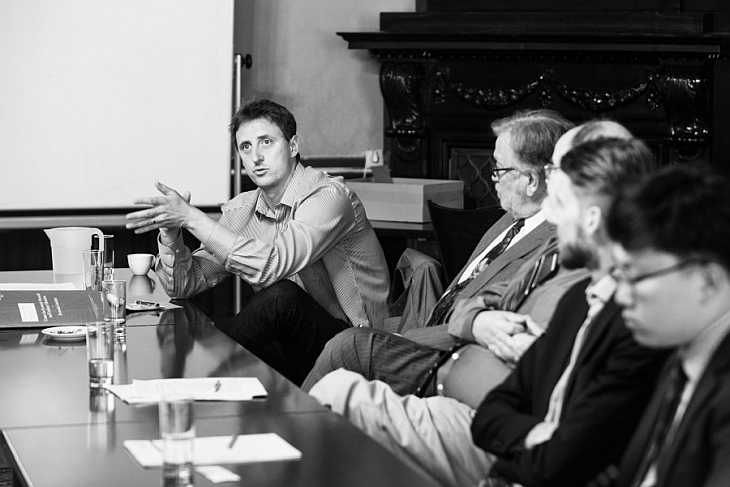takes aim at negative economic impact of coronavirus
A team of scientists from the Institute for Democracy & Economic Analysis (IDEA), a think-tank of the Economics Institute of the Czech Academy of Sciences which is part of CERGE-EI (a joint workplace with Charles University) has offered its expertise to try and curb the negative economic impact of the coronavirus pandemic. In a new project, entitled “Idea anti Covid-19”, the team hopes to provide recommendations that will make a difference in the trying days ahead.
There’s no little doubt that the Czech economy is suffering and will continue to do so the longer the coronavirus holds the country in its grip but experts at CERGE-EI are not taking the situation lying down. The whole point of “Idea anti Covid-19” is to try and provide a buffer, at least of sorts, as different sectors of the economy – from services to production – take a hit. The head of the joint workplace, Sergey Slobodyan, explains how his team aims to help:
We can provide help based on experience with best practices, reinforced by appropriate data and related studies. These recommendations are for the government, ministry experts, journalists and the public.
Daniel Münich, Slobodyan’s colleague at CERGE-EI who heads IDEA, makes clear that doctors, nurses, epidemiologists, and others are on the frontlines when it comes to confronting the real danger of coronavirus infection; but the economy also needs all the help it can get. He says economists need to do what they can to lessen the blow:
We want to use our know-how so that people don’t find themselves out of work or in spiralling debt, so that firms don’t shutter their doors for the last time and so that the economy can recover as quickly as possible – once the worst has passed.
IDEA’s first step was an article inspired by a post in a blog (A Fine Theorem) by Canadian economist Kevin Bryan (an associate professor at the University of Toronto), entitled The Simple Economics of Social Distancing and the Coronavirus. The Czech team translated the article – which outlines the necessity of social distancing to limit the potential damage of the pandemic - and added Czech context.
The original article used game theory to explore which kinds of restrictions could help especially when measured against the cost of letting the contagion run rampant. His findings? While social distancing and restrictions do have a negative impact economically, it is far less than letting a virus burn wild through society, leading to a huge loss of life and alarming swamping of the health care system.
Indeed, in recent weeks the buzzword in the media and social networks has been “flattening the curve” – ie. the use of restrictions to push down the infection rate from exponentially spreading for as long as possible, by requiring people to stay home, to work from home, and for businesses to adapt or temporarily tread water, all in the aim of ensuring there are enough beds when the crisis deepens and enough medical professionals to help.
A second article at IDEA, by economist Filip Matějka, examined steps recommended by government economists in other countries around the world. According to many experts, it is essential at this point in time to “freeze” economies where they stand and to try and help firms and households survive what is undoubtedly a very difficult period. But he admits that things are likely to get worse before they get better:
When it comes to the virus there is still a lot we don’t know. We don’t know the exact mortality rate and that remains a big unknown in all economic forecasts. As a result we have to prepare for the worst-case scenario. It is essential to test as many people as possible to find out what the real number of infections is. Not only to help those in need but to get a better idea about the full size of the problem. Only then, can we gauge what solving the problem will cost.
His recommendation? For the government to communicate quickly and clearly, to say what kind of steps it will take to help the economy so that firms, employees and independent entrepreneurs have an idea of what will be needed to weather the crisis financially. If the crisis continues longer and restrictions remain in place, the government will have to promise support. Many people simply don’t have the financial reserves to survive without.
What should not change, says economist Filip Matějka, is the current economic structure and current plans: these need to be started up as quickly as possible once the virus is reined in. Above all, he is an optimist; while the changes ahead are great and the costs significant, he is confident that with the right measures the economy can survive the current crisis and thrive again. “Fast, transparent, and fairs decisions” he suggests are what can best keep the Czech economy afloat and be ready to recover once incidence of the virus falls.
Translated by Jan Velinger

















